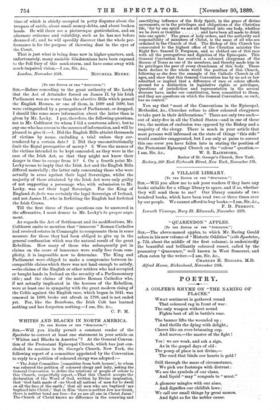[To THE EDITOR OF THE "SPECTATOR."' Sin,—Before conceding to the
great authority of Mr. Lecky that the Act of Attainder forced on James II. by his Irish Parliament was no worse than the abortive Bills which passed the English Houses, or one of them, in 1689 and 1690, but were extinguished by a prorogation of Parliament, or dropped, I should like some more information about the latter than is given by Mr. Lecky. I put, therefore, the following questions, not to Mr. Colthurst (to whom I bid a courteous adieu), but to any one who has access to the sources of information, and will be pleased to give it :-1. Did the English Bills attaint thousands of victims by name, excluding a trial unless they sur- rendered by a certain date ? 2. Did they unconstitutionally limit the Royal prerogative of mercy ? 3. Were the names of the victims intended to be kept concealed, as they were in the case of the Irish Act, so that they might not know their danger in time to escape from it ? 4. On a fourth point Mr. Lecky seems to imply that the Irish Act and the English Bills differed materially; the latter only concerning those who were actually in arms against their legal Sovereigns, whilst the majority of those attainted by the Irish Act were only guilty of not supporting a personage who, with submission to Mr. Lecky, was not their legal Sovereign. For the King of England de facto was certainly the legal Sovereign of Ireland, and not James II., who in forfeiting the English had forfeited the Irish Crown.
Till the first three of these questions can be answered in the affirmative, I must demur to Mr. Lecky's tie guogue argu- ment.
As regards the Act of Settlement and its modifications, Mr. Colthurst omits to mention that " innocent " Roman Catholics had received estates in Connaught to compensate them in some measure for those they had been obliged to give up in the general confiscation which was the natural result of the great Rebellion. How many of those who subsequently put in claims on the score of innocence were really free from com- plicity, it is impossible now to determine. The King and Parliament were obliged to make a compromise between in- compatible claims which there was not land enough to satisfy, —the claims of the English or other settlers who had occupied or bought lands in Ireland on the security of a Parliamentary title ; and the claims of the native Roman Catholics who, if not actually implicated in the horrors of the Rebellion, were at least one in sympathy with the great modern rising of the Celtic against the English race, which began in 1641, was renewed in 1689, broke out afresh in 1798, and is not ended yet. For, like the Bourbons, the Irish Celt has learned nothing and has forgotten nothing.—I am, Sir, &c-,
C. P.M.






































 Previous page
Previous page